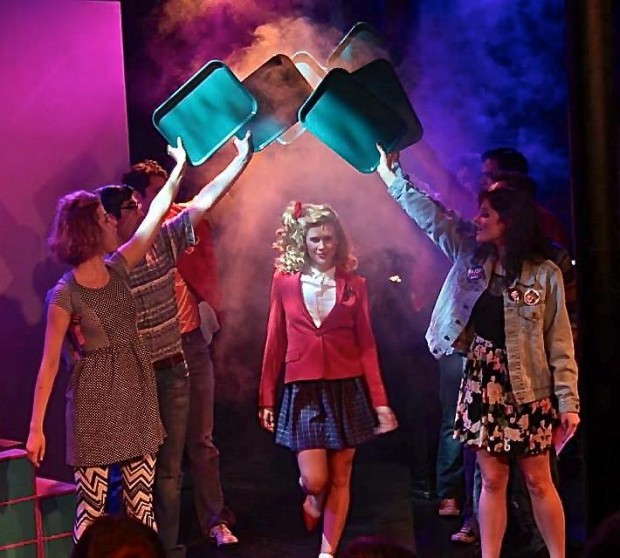You have no items in your cart. Want to get some nice things?
Go shopping
A few months ago, while watching for the tenth or eleventh time the 1989 black comedy classic Heathers, I became conscious of how difficult – even impossible – it would be to make that movie today. The Breakfast Club meets Lord of the Flies, Heathers is the bleakly satirical story of two Ohio teenagers, amped up on hormones and slushees, who – accidentally at first, then with intent – start offing their popular classmates, framing their murders as suicides and giving the school’s “Sexist Beer Guzzling-Jock-Assholes” hidden depths. Erring on the side of deadpan rather than camp, the Heathers film succeeds because of its willingness to entertain – however briefly – the idea that Veronica and J.D. might be justified. The popular Heathers (Heather Duke, Chandler and Macnamara, for the uninitiated) may not kill off their lower-status classmates, but you get the feeling that, if given the opportunity and alibi, they too just might. By the time JD and Veronica – by this point broken up over the former’s murderous methods – are grappling with a bomb in the school’s boiler room, their argument over whether or not to blow up the school is all the more chilling because, as disturbing as JD’s methods are, he does have a point. High school – as any teenage viewer of Heathers well knows – operates on the principles of dog-eat-dog. In the war for popularity, nobody emerges unscathed.
It’s not, in other words, a story that could be told in the post-Columbine era.
And, judging from the performance of Heathers: The Musical I saw last Friday at New World Stages, it hasn’t been.
The denatured Heathers: The Musical is more Heathers: High School Musical than the nihilistic classic on which it is based. While the very rough outline of the plot is there – boy meets girl, boy gets girl to accidentally kill her best friend, boy and girl embark on a killing spree – the musical suffers from an inexplicable reluctance to ever have our heroine, Veronica, do anything that might remotely affect her squeaky-clean likeability. When we meet her, she is not Winona Ryder’s jaded, sarcastic Veronica of the film – granted nominal popularity by the Heathers, gritting her teeth through every second of it but unable to face the possibility of life without their favour – but a perky ingénue, desperately wishing for popularity and ecstatic to find the Heathers granting it. (Her peers, meanwhile, don’t seem all that bad – they yell John Hughes-style stereotypes in the hallway during the opening number, but seem quite happy attending the popular kids’ homecoming party and making out with each other two songs later).
The change, it seems, is designed to make Veronica more relatable, but it only serves to make her come across as a blithering idiot, one who in the course of three songs goes from wannabe to popular girl to defiant outcast. In this iteration of Heathers, she’s so blinded by her love of JD that she blindly follows his orders; she cannot be held at least remotely responsible for any of the murders committed. (In the film, she kills at least one of the “meathead jocks” with a gun she’s been told is filled with harmless tranquilizers; it’s ambiguous whether or not she believes it. In the musical, she never fires the gun.) While film-Veronica is so fascinating precisely because of that ambiguity – high on the power Heather Chandler’s death gives her, as well as on the erotic thrill of her anarchic existence with JD, she represses her awareness of JD’s nefarious intent until it’s too late – musical-Veronica is telegraphed so strongly as a Good Girl Led Astray; she constantly tries to confess the murders, attempts suicide in order to expiate her guilt and is, in a particularly sexist change from the film, a virgin until she meets JD. Because of this, not only do we not relate her, it’s hard even to respect her. While Barrett Wilbert Weed has a compelling presence and a strong, clear, voice, she’s playing romantic comedy, not one half of Bonnie and Clyde.
JD, played by Ryan McCartan, fares a little better. While he’s initially as defanged as Veronica is – in the film, he’s introduced shooting some jocks with blanks; here, he simply punches them out, giving Veronica some more plausible deniability as to his deranged nature but also making him a great deal less interesting – when he’s finally allowed to express any psychotic urges, he tears into them with gusto: the songs “Our Love is God” and “Meant to Be Yours” are unsettling precisely because they load the conventions of musical teen romance with a sickening connotation.
Elsewhere, however, the songs are largely forgettable at best, offensively feel-good at worst. (The song “My Dead Gay Son” – in the film, the moment’s a blistering indictment of a father who can’t let go of his son’s perceived homosexuality even while mourning his death – is here a celebration of liberation, complete with sparkling rainbow ties.)
One exception, however, is the solo “Lifeboat”, the big number for Heather Macnamara, who has found herself at the bottom of the Heatherine totem pole after her leader’s death and can no longer hold back her terror of her peers and of herself. Sung with palpable desperation and real beauty by Elle McLemore, “Lifeboat” is the only song in the show to imbue the experience of high school with genuine poignancy: any sense of life-and-death stakes. In a show that’s supposed to be about murder, that’s a real oversight.
Any adaptation of an existing work is bound to make changes to better fit the medium. But Heathers: The Musical‘s interpretation of Heathers is more than mere adaptation. Heathers: The Musical’s approach comes across as a lack of faith in its audience to engage with characters who might be complex, might be difficult, might even do bad things (even a murder) now and then. Which, in turn, raises the question: why adapt a show about teenager murderers at all?
Heathers: The Musical continues at New World Stages until September. See the theatre website for more information.

About Tara Isabella Burton
Tara Isabella Burton's work has appeared or is forthcoming in Arc, The Dr TJ Eckleburg Review, Guernica, and more. In 2012 she received the Shiva Naipaul Memorial Prize for travel writing. She is represented by the Philip G. Spitzer Literary Agency of New York; her first novel is currently on submission.




